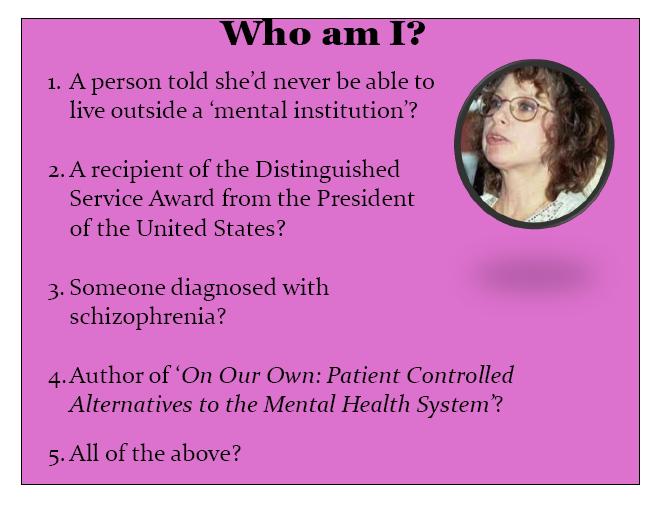Or
‘Two Big Days’

Day 1
It’s the Day. The Big Day.
I start work. I’m going to be a peer support worker.
Week 1
It was great, overwhelming, gratifying and challenging. It felt great to have all those professionals accepting me.
The ‘NUM’ explained she’d be ‘managing’ me and they’d arranged ‘external supervision’ to start this week.
She acted like I should know what that was, so I didn’t ask and look dumb.
So I googled it – “a facilitated exchange between practising professionals to enable the development of professional skills.” Exactly what I need- someone to tell me how to do this. So looking forward to it.
Supervision
What a disappointment.
Instead of clearly telling me what I should be doing, the ‘supervisor’ started by explaining how we’d ‘negotiate’ a lot of stuff about how we’d do supervision, what I’d be learning and how.
I tried though. I asked for advice how to best do some of the things that staff let me help do them at work – co-presenting in a medication information group or telling my story to nursing students or encouraging patients to take their medication.
She didn’t give clear answers, and keeps asking questions – curious questions she calls them, they seem dumb questions to me – and talking about how other PSW work and what some academics think PSW should be.
What do their opinions have to do with my work? My job is what my boss says it is and I am lucky to have it, that’s what I think.
This stuff about ‘addressing oppressive workplaces and practices that are impacting on supervisees’ is also so not what I need.
Who am I to be criticizing professionals and the way they run the service?
This job is everything I’ve been working towards, and I’m not going to mess it up by being ungrateful and critical.
I tried to be polite, agreed with anything she said, and go along, but the time drags every time I go to a session.
Week 7
I messed up today. One of the patients asked me to help her explain something to her doctor. She said she never seemed to get time or a chance to explain. So, I tried, in her review I just asked the doc who’d been doing all the talking, explaining treatment, if we could hear from her.
The way he looked at me, and I just knew I’d made a mistake.
When she left, he spoke to me sternly, saying I wasn’t supposed to disagree in front of patients. All the staff had to be ‘on message’ and on the same side.
I had to talk about it, so found myself crying, and telling the psychologist how I had made a big mistake.
The psych explained about ‘splitting’ and that the doctor was right.
He explained how, in order to survive in this field, I need to develop firm ‘boundaries’ – not let my personal feeling affect my work and not worry about work when at home.
Makes sense, I guess, but feels hard and… wrong.
Week 8
Didn’t get to work today.
Up all night thinking about how I messed up at work and how I might have helped the patient better, should have known to talk to the doctor privately, or advocated in a meeting or something.
And I just can’t get the boundaries thing happening. Even though I know the psychologist was right. it feels bad that the doctor wouldn’t even listen to her. I just couldn’t help remembering how it felt to me.
I’m sure the professionals are right, but I could just feel what she was going through and just knew she’d feel better and listen to us better if we listened to her.
If I can’t be objective, if I let my feelings make me mess up, can I work there at all?
I called in and said I had a toothache. Can’t let them know I may not be coping, might be getting sick again.
Bother! I forgot I had supervision today. If I cancel this late, the service will have to pay for nothing.
I’d better do the Zoom conference. Bother!
Started with the usual ‘check-in’ and this time I was honest and it all came tumbling out.
How I couldn’t do the boundary thing, like colleagues say I have to, couldn’t just switch off who I was and what I felt about the things people went through, maybe wasn’t well enough if I could not do those things.
I finished by saying I maybe wasn’t cut out for this work.
She took a moment, then replied, “Clear boundaries between work and personal life are important to clinical workers because experience has shown these boundaries can reduce certain risks, and because their learned experience can and should be separate from their private life.
“That’s firm guidance that comes out of their shared experience in their specific discipline.
“We’re in a different discipline. For us, our experience, our learning and who we are is something we need to use – with deliberation, intent and care – in our daily work, so just drawing a line, a boundary, between work and self doesn’t work.
We can and do address the same issues, but in a more nuanced, IPS ethics based way.
“But our different discipline, our different experiences and different capabilities mean that there are other, different challenges we face.
‘There’s an ethical challenge that many workers in our CP discipline have reported, and I wonder if it’s maybe part of what you are experiencing?
“Can I tell you about an experience of mine?”
I nodded.
“Many years ago, I was supporting someone with an important issue. We’d done a lot of work on it. He had an important meeting coming up at his house, the culmination of the work we had done.
“I didn’t usually attend external meetings, but I knew the guy, the people he was meeting with and knew if I were there to support him it would go far better.
“My boss disagreed and forbade me to attend as it was ‘outside scope’.
“I argued for it but she was so certain, and so definite about it and told me to just drop the matter and not raise it again.”
“I needed the job and I didn’t want my boss unhappy, so I shoved my feelings aside and just did as I was told.
“And I’ve regretted it ever since, for more than two decades.
“Not because of anything that happened after; I can’t be responsible for the service people, or the client.
“I was only responsible for acting in a manner consistent with my ethics, with being the person I wanted to be.
“And I didn’t live up to that vision of myself on that occasion. I could have tried to get other support, spoken other people inside my organisation, kept trying. But I thought of none of that, I got scared for my job and just stopped.
That was what I regret.”
“Does any of that sound relevant to what you experienced?”
I nodded slowly. “That’s kind of how I feel now. If I just stop trying to speak up for people, I’m not being … me. But what can I do, what did you do?”
She smiled, gestured to the two of us, and said ‘This! Reflect on incidents like that, where things don’t feel right, especially where power and oppression are involved, ‘reflexivity’. Then, ‘unpack’ them, find out exactly what happened, inside us and in our environment, and know a little better what we could do next time. Learn from the experience of others, from the literature, from conferences.
“This work is important, and hard but it’s do-able, just, because we’re not alone. We have centuries of experience, and a whole social movement behind us’.
I nodded again, and thought a bit. ‘Do you think we could go back to that ‘negotiation process’ next session? There are a few things I want to add to it.”
Year 20
I can’t believe this old diary has been at the bottom of this box for a couple of decades.
I also can’t believe my first supervisor’s patience with the naïve, stubborn newcomer. I felt like rapping my young self on the head and shouting ‘wake up!”
Well, I guess I can believe it really, from a CPS perspective. It was all about holding the reflective space.
She did a great job of steering me away from the mentor/coach relationship that I was desperate to create – ‘tell me how to be more clinical’ – I was dreadful.
Also frustrating though all those curious questions were to my younger self, not only were they in line with values of curiosity, self determination and mutuality but immensely practical as anything more direct, more judgemental would have just made me defensive – or ‘even more defensive’ to be honest.
Keeping it non-directive and letting me name the experience as long as she did was exactly right for me. I was identifying with the clinical team so much that if someone had come out and told me the simple truth, that I was being ‘co-opted’ and was experiencing more ‘role drift’ than a cow on ice skates, I doubt I’d have come back.
That went a long way towards making a space that supported my learning later, knowing she’d not been judgemental or thought less of me because of my naïve ideas It felt safe to float new observations and concerns, knowing I wouldn’t be judged, even if they didn’t turn out great.
She took a chance, though with some of her careful, respectful challenging in her observations about practice in other services and when she raised bits of Consumer Perspective values and theory.
I cringe at how defensively I reacted to the careful introduction of what seem now, these years on, like basic truths about the oppressive nature of traditional service culture and its mentalist bias. Was I ever really that young?
She did a really good job timing her first personal disclosure. Earlier, and my pervasive warm glow about being accepted by clinicians would have sparked some ready, flip rejection.
Later… Well one way or another I wouldn’t have returned to her supervision.
So I’m so thankful to her for working to provide that reflective and reflexive space, and to our comrades who developed CPS.
I’d internalised so much, was blaming myself so hard on myself for being me and not a ‘normal’ worker. I was heading to either bailing on PSW as a career because I couldn’t be ‘objective’ and create firm ‘boundaries’ or maybe worse, managing to stuff myself into that non-consumer, co-opted role.
That clinical way of working was, to be fair, the only one my managers and colleagues at work actually knew, and were able to describe. Still, it… doesn’t work for peer workers.
I work more in Consulting and Supervision now, less hands on, and my brag wall has some photographs, a couple qualifications and an award or two.
Those things I thought, decades ago, would be important, would show I ‘made it’.
But the thing I care about most, now, is the plaque in the middle, It’s the famous quote from that First Royal Commission that’s been quoted in the two subsequent Commissions into Victoria’s mental health system –
“Complex power imbalances rooted in professional, historical, social and statutory hierarchies continue to influence the opportunities available for people with lived experience of mental illness or psychological distress to lead, shape and participate in Victoria’s mental health system.”
Because what my supervisor told me once is right. This is tough work, for tough people and therefore you need your motivation. More than pay. Or promotion. Or awards.
I am now working towards the ‘Real Big Day.’
The Day one of my PSW supervisees can come in, point to that quote and say ‘That’s not the service I work in’ like I did – but unlike me, be right.
That will be a Day.

